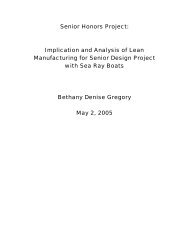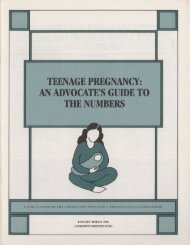child care - Digital Library Collections
child care - Digital Library Collections
child care - Digital Library Collections
You also want an ePaper? Increase the reach of your titles
YUMPU automatically turns print PDFs into web optimized ePapers that Google loves.
THE STATE OF AMERICA'S CHILDREN YEARBOOK 1998<br />
fatigue, trouble concentrating in school, and<br />
stunted growth.<br />
No relief for families with high living expenses.<br />
In 1997 the Clinton Administration proposed<br />
three measures to blunt the pain offood stamp cuts<br />
for families with <strong>child</strong>ren. One of these would have<br />
benefited poor families with <strong>child</strong>ren and high<br />
housing costs (those who spend more than half<br />
their income on rent and receive no government<br />
housing assistance). Under the food stamp rules, a<br />
portion of the money that some of these families<br />
must spend for rent is inappropriately counted as<br />
being available to purchase food. As a result, the<br />
food stamps these families receive fall short of<br />
what they actually need, and many have trouble<br />
paying their rent and utility bills and also feeding<br />
their <strong>child</strong>ren. The Administration's proposal<br />
would have meant larger food stamp benefits for<br />
families in this predicament, putting them on a par<br />
with elderly individuals and those with disabilities<br />
who have high housing costs and have long received<br />
augmented food assistance. Congress, however,<br />
refused to adopt this proposal.<br />
Congress also rejected a measure intended to<br />
soften the blow of the 1996 welfare law on parents<br />
who need cars to commute to work. The law sets a<br />
permanent ceiling of $4,650 on the market value of<br />
a car that is exempt from the food stamp program's<br />
stringent limits on assets. This frozen limit is only<br />
3 percent higher than the cap initially set in 1977.<br />
Since then, however, used car prices have nearly<br />
tripled, increasing 170 percent. As automobile<br />
costs rise with inflation in the years ahead, growing<br />
numbers of poor families who must drive to work,<br />
especially those in rural areas and parents commuting<br />
to suburban jobs from inner cities, may become<br />
ineligible for food stamps.<br />
The welfare law also freezes the standard deduction<br />
for food stamp recipients-the amount<br />
subtracted from the income of most food stamp<br />
households for the purpose of calculating benefit<br />
levels. The Administration proposed a change in<br />
the rules so that the deduction would eventually<br />
keep pace with the cost of living, as it had in the<br />
past. Again, however, Congress rejected the plan,<br />
and a permanent freeze remains in effect. As inflation<br />
raises the cost of food and other necessities<br />
and the standard deduction stays constant, these<br />
families will fmd it a little tougher each year to<br />
adequately feed their <strong>child</strong>ren and themselves and<br />
cover other expenses.<br />
• Of the 13.2 million <strong>child</strong>ren who received monthly food stamps<br />
in FY 1996, nearly 80 percent were under the age of 12, and 37<br />
percent were under age 5. Thirty-seven percent were Black, 36<br />
percent were White, and 21 percent were Hispanic.<br />
• More than 5 million families with <strong>child</strong>ren will lose an average of<br />
$36 each month in food stamp benefits during FY 1998.<br />
• In 29 cities nationwide, requests for emergency food aid jumped an<br />
average of 16 percent in 1997. Most of the requests came from<br />
families with <strong>child</strong>ren, and nearly one in five went unmet.<br />
• During the 1997 school year, 26.9 million <strong>child</strong>ren received free<br />
or subsidized lunches, and almost 7.1 million received a daily<br />
breakfast at school.<br />
56 CHI LOR EN'S 0 E F ESE F U 0














